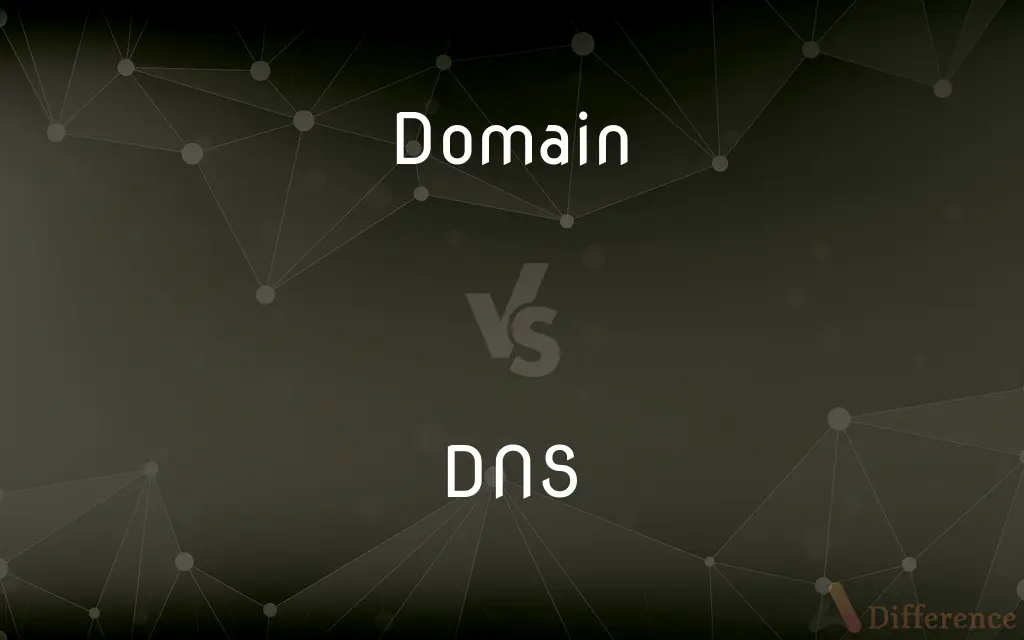Domain vs. DNS — What's the Difference?
By Maham Liaqat & Fiza Rafique — Published on February 24, 2024
A domain is a human-friendly web address name, while DNS (Domain Name System) translates these names into IP addresses for locating web resources.

Difference Between Domain and DNS
Table of Contents
ADVERTISEMENT
Key Differences
A domain, or domain name, is the readable address used to visit websites, such as "example.com." It's designed to be easily remembered and typed by users, bypassing the need to memorize complex numerical IP addresses. In contrast, the Domain Name System (DNS) is a critical internet service that translates these human-friendly domain names into the numerical IP addresses that computers use to identify each other on the network. Essentially, when you type a domain name into your browser, the DNS is responsible for finding the corresponding IP address so your browser can load the correct website.
Domains are structured in a hierarchical format, including top-level domains (TLDs) like ".com" or ".org," and possibly subdomains like "blog.example.com." This structure allows for organized and scalable naming. The DNS, on the other hand, operates as a distributed database across numerous servers worldwide, ensuring that the translation from domain names to IP addresses is done efficiently and with redundancy to prevent a single point of failure.
The registration of a domain name is a straightforward process managed by domain registrars. Once registered, the domain name becomes part of the DNS. However, for the domain to be reachable, it must be configured in the DNS with records that point to the IP addresses of the servers hosting the domain's content. This connection between the domain and its online presence is made possible through DNS records such as A records for IPv4 addresses, AAAA records for IPv6 addresses, and MX records for mail servers.
Both domains and DNS are essential components of internet infrastructure, facilitating the easy access and management of online resources. While the domain provides a memorable name for an online location, the DNS ensures that this name can be translated into actionable information that allows computers to locate and retrieve the desired web content.
DNS security measures, like DNSSEC (DNS Security Extensions), enhance the integrity and trustworthiness of the DNS process by adding layers of authentication, which are crucial in preventing attacks such as DNS spoofing. These security measures are vital for maintaining the reliability of converting domain names to IP addresses, underscoring the interdependent relationship between domains and DNS in the safe and efficient navigation of the internet.
ADVERTISEMENT
Comparison Chart
Definition
Human-readable address for a website.
System that translates domain names to IP addresses.
Function
Identifies an internet resource by name.
Translates domain names into numerical IP addresses.
Structure
Hierarchical, including TLDs and possibly subdomains.
Distributed database across numerous servers worldwide.
Managed By
Domain registrars.
Network administrators and DNS hosting services.
Example
"example.com"
Resolving "example.com" to "93.184.216.34"
Compare with Definitions
Domain
Registered through a domain registrar.
She registered the domain 'mywebsite.com' for her blog.
DNS
Operates worldwide for redundancy and efficiency.
DNS queries are fast thanks to its distributed network.
Domain
Web address of an internet resource.
Google's domain is 'google.com'.
DNS
Includes records for different services.
MX records in DNS direct email to the right server.
Domain
Can include subdomains for organization.
Shop.example.com is a subdomain for the retail section.
DNS
Requires configuration for domains to be reachable.
Configuring DNS properly is essential for website accessibility.
Domain
Requires renewal.
They forgot to renew their domain, causing the website to go offline.
DNS
Enhances with security protocols like DNSSEC.
DNSSEC prevents attackers from hijacking DNS queries.
Domain
Represents a brand or identity online.
Their domain name perfectly captures the essence of their brand.
DNS
Translates domain names to IP addresses.
DNS converts 'facebook.com' into its IP address.
Domain
(Computers)A group of networked computers that share a common communications address.
Domain
(computing) Such a region used as a data storage element in a bubble memory.
Common Curiosities
How does DNS work?
DNS translates domain names into IP addresses, allowing browsers to locate and display websites.
Why are domains important?
Domains provide an easy-to-remember way to access websites, essential for branding and online presence.
What is a domain?
A domain is a human-readable web address that identifies internet resources such as websites.
Can a domain point to multiple IP addresses?
Yes, through DNS configurations, a domain can point to multiple IP addresses for load balancing and redundancy.
How do you get a domain?
Domains can be registered through domain registrars by choosing an available name and paying a registration fee.
What is DNSSEC?
DNSSEC is a suite of extensions to DNS that provides validation for DNS responses, enhancing security.
Is it possible to change a domain's DNS settings?
Yes, domain owners can change their DNS settings to point to different hosting servers or configure services.
Do domains and DNS work together?
Yes, domains and DNS work together to translate human-friendly web addresses into IP addresses that computers use.
What happens if DNS fails?
If DNS fails, websites cannot be accessed through their domain names, impacting internet navigation and services.
Why is DNS considered a distributed database?
DNS is spread across many servers worldwide, ensuring resilience and efficient access to domain information.
What is an A record in DNS?
An A record maps a domain to its corresponding IPv4 address in the DNS.
Can anyone manage a DNS?
DNS management is typically handled by network administrators or specialized DNS hosting services.
How do subdomains work?
Subdomains are extensions of the main domain, used to organize or navigate to different sections of a website.
What role does a TLD play in domains?
A TLD (Top-Level Domain) is the last segment of the domain name, indicating the domain's category or country.
How can DNS impact website performance?
Efficient DNS resolution is crucial for fast website loading times; delays in DNS lookup can slow down access to the site.
Share Your Discovery

Previous Comparison
Toyota Kluger vs. Mitsubishi Outlander
Next Comparison
Chinos Pants vs. Cotton PantsAuthor Spotlight
Written by
Maham LiaqatCo-written by
Fiza RafiqueFiza Rafique is a skilled content writer at AskDifference.com, where she meticulously refines and enhances written pieces. Drawing from her vast editorial expertise, Fiza ensures clarity, accuracy, and precision in every article. Passionate about language, she continually seeks to elevate the quality of content for readers worldwide.
















































